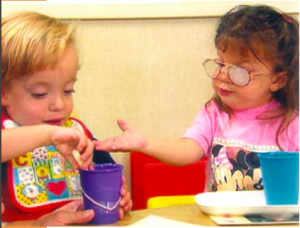6 Families of Children with Special Needs or Special Health Care Needs
Children with disabilities or other special needs refers to children with a specific diagnosis, as well as children who do not have a diagnosis but whose behavior, development, and/or health affect their family’s ability to maintain child care services. The disability or special need may be as mild as a slight speech delay or as complex as a mixed diagnosis of motor challenges, vision impairment, and cognitive delays. [144] Special health care needs include a variety of conditions such as birth defects, neurological disorders, and chronic illnesses that can be life threatening or impact daily living (e.g., cancer, sickle cell disease [or anemia], cystic fibrosis, hemophilia, AIDS, diabetes, juvenile rheumatoid arthritis).[1]
Families of children with disabilities or other special needs have the same need for child care as do other families. However, families of children with disabilities or special needs often find the search for quality and affordable child care a greater challenge as they face the reluctance of many child care providers to enroll their children. This situation makes it all the more important that child care providers strive to include all children in their programs so as not to increase the immense challenges that such families already face.[2]
It is critical that children with disabilities or other special needs, and their families, are included in quality early childhood education programs that are the natural environments of their peers who are typically developing. Children learn from their interactions with other children and their surroundings while developing a sense of security and self-esteem from caring relationships with program providers and staff. Everyone benefits from quality early childhood education programs that provide inclusive care. Children who have a disability or special need get to know and interact with typically developing peers, while their families benefit from programs and services they need to achieve their parenting goals. Children who are typically developing benefit when they have the opportunity to get to know peers who are atypically developing in the classroom. Everyone has the opportunity to learn about other human beings in regard to their strengths and challenges.

Children and families want to be accepted and included in their community regardless of ability. They want to truly belong. But the kind of belonging they desire goes beyond simply “being together.” They want full, unconditional membership in family and community. As Norman Kunc, a disability rights advocate, said so eloquently, “When inclusive education is fully embraced, we abandon the idea that children have to become ‘normal’ in order to contribute to the world. Instead, we search for and nourish the gifts that are inherent in all people. We begin to look beyond typical ways of becoming valued members of the community and, in doing so, begin to realize the achievable goal of providing all children with an authentic sense of belonging.”
Children with disabilities or other special needs may present unique challenges, but the care they need is very similar to that needed by any child. Children with special needs spend most of their time doing what other children do. They have the same curiosity, desire to play, and need to communicate as their peers do. Childcare providers who are providing developmentally appropriate childcare, which is individualized to meet the needs of each and every child, already have many of the skills needed to serve children with disabilities or other special needs.[3]
Unit Attribution
Adapted from Families of Children with Special Needs or Special Health Care Needs in the open textbook The Role of Equity and Diversity in Early Childhood Education by Krischa Esquivel, Emily Elam, Jennifer Paris, & Maricela Tafoya. CC BY license.
- California Department of Education. (2016). Family Partnerships and Culture. https://www.cde.ca.gov/sp/cd/re/documents/familypartnerships.pdf ↵
- Ibid. ↵
- California Department of Education. (2009). Inclusion Works! Creating Child Care Programs That Promote Belonging for Children with Special Needs. https://rideproject.eu/media/inclusionworks.pdf ↵

